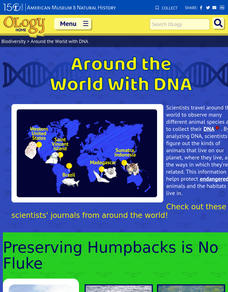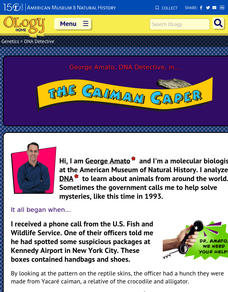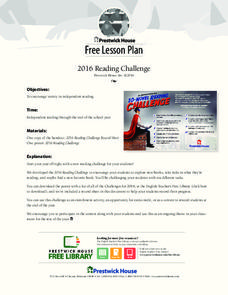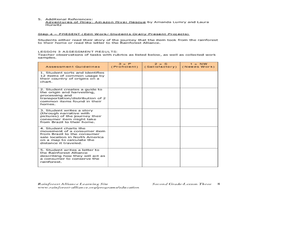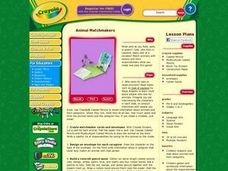ARKive
Adaptations to Arid Habitats
How do plants and animals survive in habitats with very little water? Explore arid ecosystems and the way their inhabitants have adapted with a activity and science experiment. After kids listen to a presentation about adaptation, they...
ARKive
Adaptations for Movement
What animals are best suited for moving around a rainforest, or a desert? Design your own animal species based on a particular habitat, focusing on the characteristics it will need for optimal movement. Great as a group lesson or...
EngageNY
Interpreting Residuals from a Line
What does an animal's gestation period have to do with its longevity? Use residuals to determine the prediction errors based upon a least-square regression line. This second lesson on residuals shows how to use residuals to create a...
American Museum of Natural History
Around with World with DNA
A mammalogist, ornithologist, ichthyologist, and a conservation geneticist share their work and their hopes that their research will help protect and save endangered species and their habitats.
American Museum of Natural History
What's This?: Mythic Creatures
Fantastic beasts, and where to find them, are featured in a resource that offers images of real animals that just might have given rise to some of mythic creatures of legend.
American Museum of Natural History
What's This? Reproduction
Attracting the right mate is as important for humans as any other species. An interesting lesson teaches individuals about several strategies that animals and plants have adapted to attract their mates. From colorful nests to powerful...
Smithsonian Institution
Trait Tracker
Help mice beat the odds with an exciting activity about traits. Biologists discover the role of diet and other factors on animal traits by participating in a simulation activity. Teams collect and evaluate data to understand how certain...
NOAA
Climate Is Our Friend…Isn’t It?: Make an Extinction Polyhedron
Climate affects populations in different ways. Scholars research extinct organisms and mass extinctions in part three of the 10-installment Discover Your Changing World series. They create graphic organizers, then fill in the...
Cold Spring Harbor Laboratory
Master Genes Control Basic Body Plans
Have you ever been so tired you missed a major announcement? Eric Wieschaus woke to a call explaining he won the Nobel Prize, but he thought it was just a dream until Christiane Nusslein-Volhard, a co-winner, explained it to him later...
EngageNY
Grade 9 ELA Module 3, Unit 2, Lesson 4
It seems like the first result in a search engine is the best source, but how can you be sure? An activity on assessing sources guides ninth graders through an integral part of their inquiry-based research project, based on questions...
Curated OER
Life Systems- Zoo Central
Students investigate the various aspects associated with living things while also concentrating on their basic needs. They explore the aspects of movement and growth in plants and animals. This is done through research and other...
National Wildlife Federation
Massive Migrations
Turn your students into flocks of migratory birds for this fun lesson on animal migration. Prior to the activity, the teacher creates four different migration routes in the classroom or any available open space, labeling nesting...
American Museum of Natural History
DNA Detective
Match up the DNA code. Pupils read the website from the American Museum of Natural History about how DNA can determine whether a skin is from a particular type of reptile. Using the same technique, learners match up products with the...
American Museum of Natural History
Make Your Own Creatures of Light
Bioluminescent animals are the focus of a hands-on craft in which scholars create a scene of either a land or sea bioluminescent creature.
Star Wars in the Classroom
Star Wars Geography Unit
What kind of animals live on an ice planet like Hoth? How would the habitat on Tatooine allow different organisms to thrive? Connect social studies, science, and Star Wars in one engaging activity that focuses on the ecosystems...
EngageNY
Adding to Cascading Consequences and Stakeholders: Industrial Food Chain
Young researchers create a class Cascading Consequences chart to see how the industrial food chain affects people, animals, and the environment. They also work in teams to complete a Stakeholders chart for the industrial food chain model...
Curated OER
Landscape Garden Makeover
A project-based learning plan focuses on landscapes in the community. After identifying problems, such as dead trees or misplaced automatic sprinklers, learners design solutions, contact local organizations to fix the problems, and do...
Prestwick House
Reading Challenge
One of the big challenges of assigning independent reading is helping class members find a book to read. Another is encouraging readers to read a variety of genres. Never fear, help is here in the form of a quest that asks individuals to...
Curated OER
King of Beasts
Young scholars conduct research on lions and their natural habitats and how zoos provide lions with more natural surroundings while in captivity. They draw a picture of a lion in a habitat of their choice and add details to the scene's...
Howard Hughes Medical Institute
Building Ecological Pyramids
Looking for a fresh take on traditional food/energy pyramids? Conduct an innovative activity where pupils build their own! The lesson uses research data from Gorongosa National Park in Mozambique for a real-life safari touch. Scholars...
Curated OER
Young Ones
This is the cutest reference materials activity ever! Researchers complete six sentences on baby animal names, continuing the pattern by writing five more sentences about other animals from their research. They use a thesaurus to look up...
Curated OER
Products from the Rainforest
Second graders write a story about the journey a food has from the rainforest to your table. For this food lesson plan, 2nd graders research different foods and products that come from the rainforest and discover how it ended up in their...
Curated OER
Animal Matchmakers
Students read about and research animals and their caregivers. They gather information about the responsibilities of caring for different types of animals and create their own animal matchmaking game, including fact cards and display...
Curated OER
Come to the Fair
Young scholars explore the concept of animal welfare. In this service learning lesson, students present a "Career with Animals" exposition as they research animal welfare careers and present their findings to their peers.
Other popular searches
- Animals Research Projects
- Rain Forest Animals Research
- Rainforest Animals Research
- Abc Animals Research
- Music Animals Research



